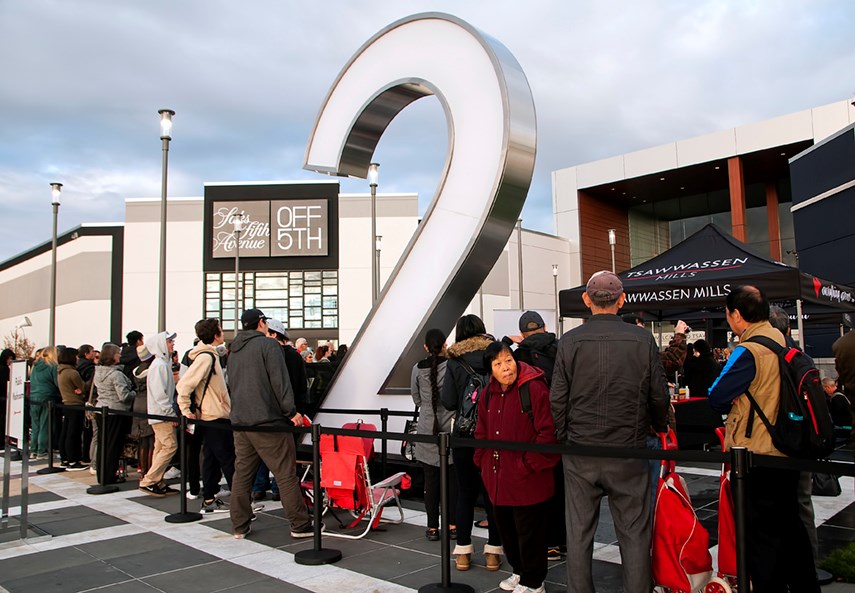The giant Tsawwassen Mills shopping centre, the largest enclosed mall built in Canada since 2009, opened its doors to a throng of shoppers earlier this month – and underlined the surge in B.C. retail spending.
“Today is a day of enormous pride at Ivanhoé Cambridge. Tsawwassen Mills delivers on our promise made and more: a terrific retail mix in a state-of-the-art property”, said Daniel Fournier, chairman and CEO, Ivanhoé Cambridge. “We thank our friends of Tsawwassen First Nation for the spirit of co-operation since the very beginning of this great project.”
Ivanhoé Cambridge, the real estate arm of Quebec’s largest pension fund, Caisse de dépôt et placement du Québec, spent $600 million developing Tsawwassen Mills, which is built on land leased from the Tsawwassen First Nation in South Delta.
The enclosed mall covers 22 acres with more than 1.2 million square feet of leasable space, second only in B.C. to the Metrotown mall complex in Burnaby.
Tsawwassen Mills is divided into five distinct retail areas. each featuring its own custom artwork and design elements. A total of 180 retail brands are confirmed, including 18 that are first-to-market in B.C., such as: Bass Pro Shops Outdoor World, DSW–Designer Shoe Warehouse, Pro Hockey Life, Saks Off 5TH, The Outlet by Harry Rosen, Michael Kors Outlet, a Browns Outlet and others. Lululemon Athetica, the iconic B.C. sportswear retailer, has its first outlet outlet store in the mall.
The centre includes a 1,100-seat food hall, four sit-down restaurants, a children’s play area, a sports dome and six public entrances, each with its own special design features. Additionally, several stores offer unique entertainment options, including a bowling alley in the massive Bass Pro Shops.
The mall proved an immediate hit.
Around 3,000 people were in line when the doors opened at 10 a.m. but some started arriving around midnight the night before and the line quickly swelled a few hours before the doors opened.
Approximately 284,000 shoppers jammed the mall during the first six days.
Tsawwassen Mills general manager Mark Fenwick was not surprised with the response, given the success of the company’s similar outlet mall north of Calgary, CrossIron Mills.
The Tsawwassen First Nations is now working with a separate developer on a 550,000-square-foot big-box centre that will be built adjacent to Tsawwassen Mills.
The new Mills centre is not the only large mall to open in the region.
Last July, British-based McArthur Glen opened a 240,000-square-foot outlet mall nearby Richmond. That mall attracted 4.2 million shoppers, about 30 per cent more than projected, in its first 11 months. Planning for the outlet centre’s 150,000-square-foot second phase is underway.
Meanwhile, commercial real estate investors have also caught the shopping bug, snapping up more than $380 million worth of shopping malls in the past two years. Big sales include Royal City Centre in New Westminster, bought for $114.7 million; the $78 million sale of Surrey’s Peninsula Village; and the $46 million sale of a 23,000-square-foot centre on West Broadway in Vancouver.
It is B.C.’s nation-leading consumer spending that is driving the retail surge.
Retail sales growth in B.C. picked up again in July to outpace its provincial peers, according to Central 1 Credit Union, B.C.
Total dollar-volume of retail sales climbed 0.9 per cent from June to a seasonally-adjusted $6.25 billion, compared with a national sales decline of 0.1 per cent.
Year-over-year sales growth accelerated to remain far above the rest of the country at 6.4 per cent in July, compared to 2.3 per cent nationally.
Nearly all retail segments posted gains, with the strongest in building materials, gardening equipment, home furnishings and motor vehicle sales.
Retail spending in B.C. is concentrated in Metro Vancouver. Year-to-date sales growth was led by an 8 per cent surge in Metro Vancouver, with a 5 per cent rise elsewhere in the province.
B.C. consumer spending is forecast to remain solid with annual growth of 6 per cent to 6.5 per cent, but there are risks related to a recent downturn in Metro Vancouver housing activity, Central 1 concludes.



